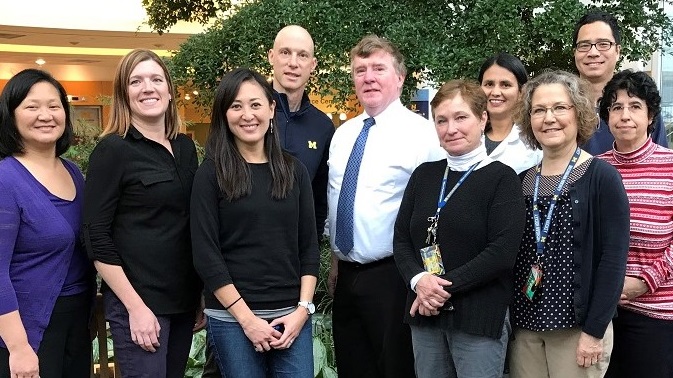Organ transplants are lifesaving medical miracles for more than 30,000 people per year in the United States – but they come with potentially serious side effects.
Drugs that suppress the immune system keep the body from rejecting the donated organ, but they also lower the patient’s ability to fight off infections. Immune suppression can increase the risk of certain cancers, as the normal immune system is responsible for vigilantly removing such cells.
Solid organ transplant recipients are two to four times more likely to develop cancer than non-recipients, according to recent studies. Doctors aim for dosages that are high enough to prevent rejection, yet not so high that the patient is vulnerable to infections and cancer – but they have few tools for measuring these relative risks.
Finding the right balance of immune suppression for individual patients is “the holy grail” for organ transplantation doctors, said Daniel Goldstein, MD, a physician and professor at Michigan Medicine. Goldstein is the lead investigator for a Taubman Institute-supported study to refine the use of immunosuppressants in individuals undergoing heart, kidney, liver or lung transplantation. The Taubman Institute, established at U-M in 2007, provides grants to physician-investigators engaged in biomedical research.
“Organ transplant works very well and saves lives, but the patients potentially pay a price that comes with immune suppression” said Goldstein.
“We ask ourselves, if someone has no evidence of acute rejection, have we suppressed their immune system only to a necessary level, so the body still can fight infection and cancer?”
Developing a method to predict a patient’s risk of immunity-related side effects — instead of reacting after problems arise – is the goal of the new research project. Goldstein will lead a group of University of Michigan experts in transplantation, including Mona Doshi, MD; Vibha Lama, MD; John Magee, MD; Pratima Sharma, MD and Randall Sung, MD.
U-M’s solid organ transplant program provides patients with more than 350 donated kidneys, lungs, hearts, livers and other organs each year.
The investigators will be joined by other U-M researchers, including:
- Vici Blanc, PhD (Central Biorepository of samples)
- Fei Wen, PhD (immune monitoring)
- Min Zhang, PhD and Hui Jiang, PhD (bioinformatics and statistics)
Blood and organ tissue samples will be analyzed using a new immune phenotyping process called mass cytometry, which can examine up to 40 different immune function-related parameters on a single cell.
Nicknamed CyTOF, “it is a novel way to look at someone’s immune system,” said Goldstein, who directs U-M’s basic science center on cardiovascular aging in addition to running his own research laboratory. “We will be taking patient samples in the early stage of transplantation and surveying their immune system at a level not done before in transplantation studies”.
“There is no point in doing it five years after the transplant when the horse is out of the barn and they are either over- or under-suppressed,” he said. “It’s better to gauge it before the risks have accumulated.”
Tissue collected from patients also will be used to create a central biorepository for use by other researchers.
While people receive transplantations for different reasons, the problems caused by immunosuppression are similar.
In studying all solid organ transplant patients, no matter what organ is being replaced, the team will be able to gain information more quickly about the adverse effects of suppression drugs, said Charles F. Burant, MD, PhD, director of the Taubman Institute. “Finding a better way to optimize the dosage of immune suppressive drugs takes us further in the direction of the personalized patient care that truly is the future of medicine.”






